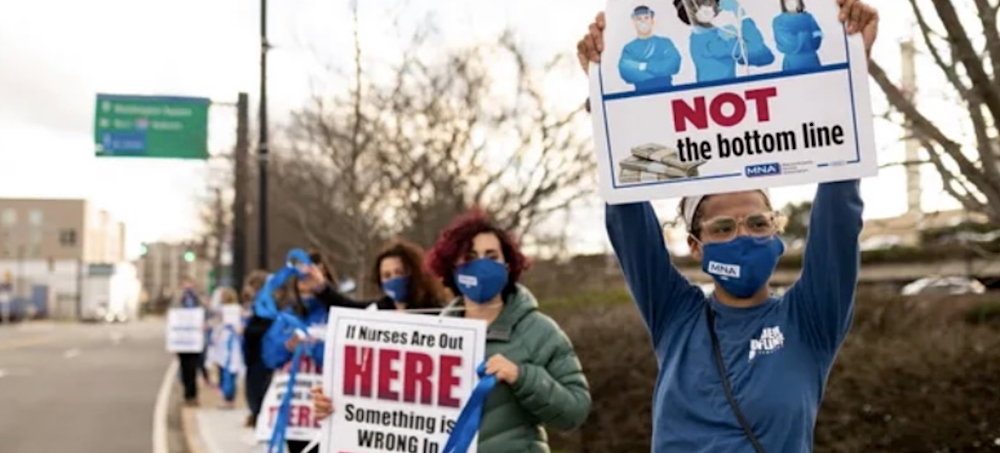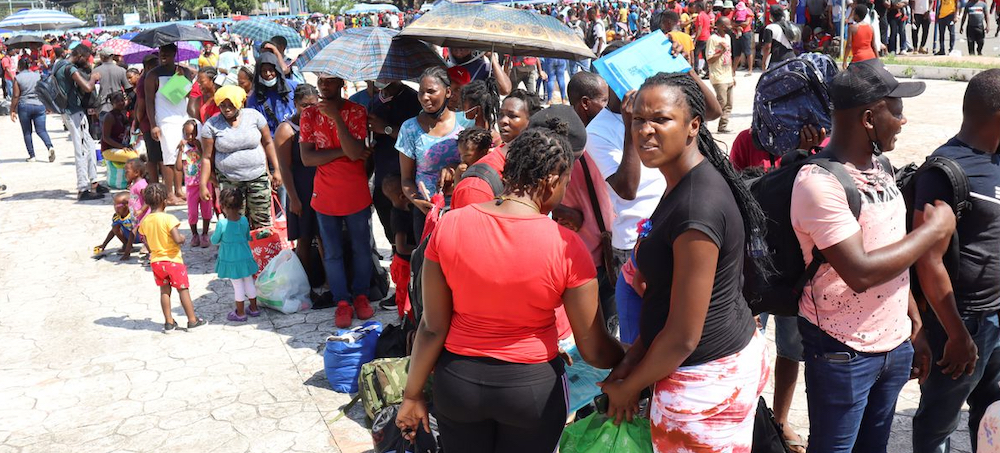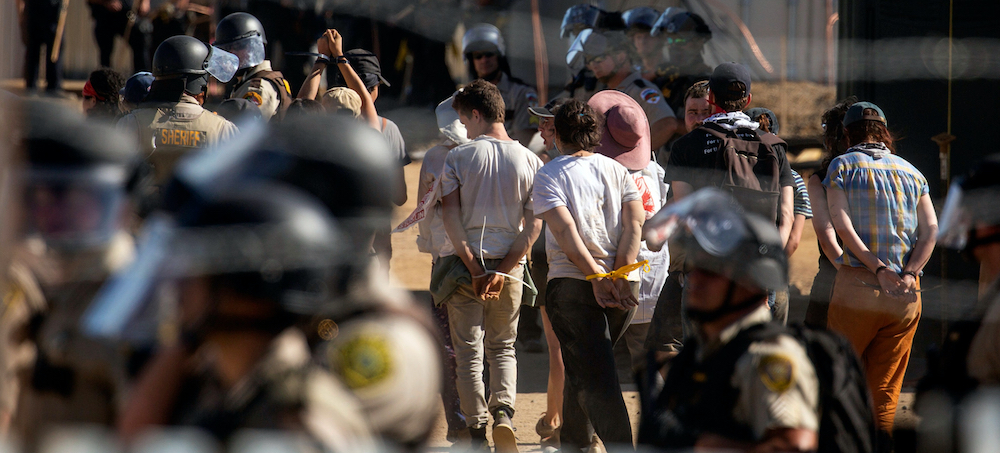
08 January 22
Live on the homepage now!
Reader Supported News
RIGHT NOW RSN IS BEING TREATED AS NONESSENTIAL — Tens of thousands of readers come here every day. But when it comes to sustaining the organization RSN is treated as nonessential. The money goes directly into political campaigns ignoring the need for uncompromised, independent reporting. Like every other organization RSN must have a budget. Correct this problem.
Marc Ash • Founder, Reader Supported News
Sure, I'll make a donation!

Andy Borowitz | Sean Hannity Informs January 6th Panel That Swearing to Tell the Truth Would Violate His Contract With Fox
Andy Borowitz, The New Yorker
Borowitz writes: "Sean Hannity has informed the congressional committee investigating the U.S. Capitol insurrection that swearing to tell the truth would be a violation of his contract with Fox News."
The article below is satire. Andy Borowitz is an American comedian and New York Times-bestselling author who satirizes the news for his column, "The Borowitz Report."
Sean Hannity has informed the congressional committee investigating the U.S. Capitol insurrection that swearing to tell the truth would be a violation of his contract with Fox News.
In a written statement, Hannity said that taking an oath “to tell the truth, the whole truth, and nothing but the truth” would be “a betrayal of the solemn vow I made to Fox.”
“The members of the committee would no doubt require me to swear on a Bible,” he said. “However, I answer to a higher power: Rupert Murdoch.”
The committee members attempted to reassure Hannity that he would need to tell the truth only to them and not while he was doing his show, but he remained steadfast in his refusal.
“Telling the truth is a deal breaker,” Hannity said. “If I am seen doing it even once, it could destroy my brand.”
READ MORE
 Senator Joe Manchin of West Virginia. (photo: Kevin Dietsch/Getty Images)
Senator Joe Manchin of West Virginia. (photo: Kevin Dietsch/Getty Images)
Joe Manchin Appears to Have Withdrawn Offer to Back $1.8 Billion Bill on Biden Agenda
Reuters
Excerpt: "A $1.8tn spending offer proposed to the White House in late 2021 by Senator Joe Manchin appears to be off the table, following another breakdown in talks between the moderate Democrat from West Virginia and the Biden White House, the Washington Post reported on Saturday."
Conservative Democratic senator has signalled privately he is not interested in supporting any Build Back Better package
A $1.8tn spending offer proposed to the White House in late 2021 by Senator Joe Manchin appears to be off the table, following another breakdown in talks between the moderate Democrat from West Virginia and the Biden White House, the Washington Post reported on Saturday.
Manchin told reporters this week he is no longer involved in discussions with the White House and has signaled privately that he is not interested in approving any legislation like Joe Biden’s Build Back Better Package, the newspaper said, citing three people with knowledge of the matter.
Manchin’s office did not immediately respond to a request for comment.
The legislation is one of Biden’s signature domestic priorities. Manchin’s vote is critical in the evenly divided Senate. In December, his opposition torpedoed Build Back Better, drawing ire from progressives and sending the party scrambling to find a way to resurrect the package.
Biden’s plan includes funding for high-priority issues for many Americans, including free pre-school, support for childcare costs, coverage of home-care costs for the elderly and expansion of free school meals. It also seeks to fund measures to combat the climate crisis.
Manchin has spoken with officials and others seeking to garner his support, the Post said, among them the senior White House aide Steve Ricchetti; a former economic adviser to Donald Trump, Larry Kudlow; and the Republican senator Mitt Romney, of Utah.
Manchin is the only Democrat in major elected office in West Virginia. Attempts to secure his support for Build Back Better have been dogged by fears he could quit the party, either to sit as an independent or to switch to the Republicans, thereby tipping the Senate to the GOP.
READ MORE
 Bernie Sanders. (photo: Antonella Crescimbeni)
Bernie Sanders. (photo: Antonella Crescimbeni)
Bernie Sanders Hosts Virtual Meeting With Union Workers Across the US
Carly Laing, CBS 42
Laing writes: "Wednesday Senator Bernie Sanders held a virtual meeting with union workers from across the country. It's regarding their fight against big corporate companies, including a coal mine here in Alabama."
Wednesday Senator Bernie Sanders held a virtual meeting with union workers from across the country. It’s regarding their fight against big corporate companies, including a coal mine here in Alabama.
Workers at Warrior Met Coal have been on strike since April 2021 and they say they are fed up.
Workers are pushing for better wages and benefits. According to the United Mine Workers of America, back in 2016, in an effort to keep the company alive and jobs in the community, coal miners agreed to a $6-an-hour pay cut and a substantial reduction in their healthcare and retirement benefits. It was part of a restructuring deal. Now, years later workers say they have still not seen their pay bounce back, with the exception of a $1.50 an hour increase.
Braxton Wright said his employers told them “you don’t deserve it.”
“We’re not even asking for more than what we had, we’re just asking to get back what we gave up so the company could be profitable again. They say they can afford it but we don’t deserve it,” said Wright.
In April 2021, the company sent out a statement saying, in part: “Throughout negotiations, our sight has remained on the future — to provide our employees with a competitive package while protecting jobs and the longevity of the company and its workforce.”
CBS 42 reached out for comment on Wednesday’s meeting. We are still waiting to hear back.
Right now, about 1,100 workers at Warrior Met Coal remain on strike.
READ MORE
 The Knoxville Planned Parenthood clinic on fire. (photo: Twitter/@cole_sull)
The Knoxville Planned Parenthood clinic on fire. (photo: Twitter/@cole_sull)
A Fire That Destroyed a Planned Parenthood Building Was Intentionally Set
Tien Le, NPR
Le writes: "The New Year's Eve fire that destroyed a Knoxville, Tenn., Planned Parenthood building was intentionally set, investigators and officials have ruled."
The New Year's Eve fire that destroyed a Knoxville, Tenn., Planned Parenthood building was intentionally set, investigators and officials have ruled.
The fire was ruled an arson on Thursday after officials from the Knoxville Fire Department and the Bureau of Alcohol, Tobacco, Firearms and Explosives (ATF) investigated the scene. Officials say they don't know who set the fire.
On Dec. 31, the Knox County Emergency Communications Center received a call at 6:39 a.m. about a building on fire. When crews arrived, they found a single-story commercial building with a fire that reached through the roof.
The fire, which was quickly put out, caused a "total loss" of the building, the fire department said. There were no injuries.
"This is an appalling and heartbreaking act of violence towards Planned Parenthood, our patients, and our community," Ashley Coffield, president and CEO of Planned Parenthood of Tennessee & North Mississippi, said in a statement. "Unfortunately, this is not the first time we have mourned at this health center."
This was the second attack in the past year at the Knoxville location. On Jan. 22, 2021 — the 48th anniversary of Roe v. Wade -- an unidentified gunman shot through the doors of the building.
The building was undergoing a $2.2 million renovation and expansion when the fire took place.
"It must be made clear that these hateful acts go much further than property damage — they harm the patients who depend on safe Planned Parenthood health centers, staff, and providers to receive trusted, essential health care services," Alexis McGill Johnson, president and CEO of Planned Parenthood Federation of America, said in a statement.
The Knoxville Fire Department is asking the community to share information related to the fire through the number 1-800-762-3017 or email KFDArson@knoxvilletn.gov. It's offering a reward of up to $10,000 for information that leads to prosecution.
READ MORE
 Saint Vincent hospital nurses on strike in Worcester, Massachusetts. (photo: Massachusetts Nurses Association)
Saint Vincent hospital nurses on strike in Worcester, Massachusetts. (photo: Massachusetts Nurses Association)
Last Year's Longest Strike Just Ended in Victory
Nora De La Cour, Jacobin
De La Cour writes: "After spending most of 2021 on the picket line, nurses at Saint Vincent Hospital in Worcester, Massachusetts, are returning to work."
After spending most of 2021 on the picket line, nurses at Saint Vincent Hospital in Worcester, Massachusetts, are returning to work. Their strike holds two lessons: health care corporations will erode standards infinitely for profit, and worker solidarity is the only way to stop them.
After most of a year on the picket line, the nearly seven hundred nurses who struck at Saint Vincent Hospital in Worcester, Massachusetts, are preparing to return to work. This concludes the longest strike in the United States in 2021 and the longest nurses’ strike in Massachusetts history. According to the nurses’ union, the Massachusetts Nurses Association (MNA), it was also the longest nurses’ strike the United States has seen in more than fifteen years.
On December 17, 2021, the nurses reached a tentative contract agreement with the hospital and its for-profit owner, Dallas-based Tenet Healthcare. On Monday, they voted overwhelmingly to ratify the new contract, which locks in staffing improvements to ensure patients receive better care.
The lessons we can draw from this strike are twofold. First, health care corporations like Tenet will go to every length imaginable to avoid subtracting from their profits to raise standards of care. And second, worker solidarity is the only reliable way to check these corporations’ power.
Unsafe Staffing Levels
Saint Vincent nurses walked out on March 8, 2021, after trying for eighteen months to force their employer to fix serious safety problems at the hospital. Chief among their concerns was a pattern of chronic understaffing that the nurses say endangered patients.
One of the nation’s largest health care systems, Tenet Healthcare has raked in record profits during the pandemic while implementing bare-bones staffing and other cost-cutting measures at its facilities, with results Tenet workers say have been appalling.
The relationship between nurse staffing levels and patient care outcomes is well documented, with research suggesting that the chances of in-patient death jump 7 percent with each additional patient a nurse is assigned to care for.
Back in 2018, the MNA fought for Massachusetts to follow the example set by California, the only state with legally defined nurse-to-patient ratios. California’s nurse staffing law has improved care outcomes, particularly for poor patients. In Massachusetts, the hospital lobby managed to reverse initial public support for the 2018 ballot measure by launching an aggressive campaign to confuse voters that eventually defeated the measure.
After trying and failing to create change through the ballot box and various shop-floor strategies, the MNA nurses hit the picket lines to protest understaffing at Saint Vincent Hospital.
An Arduous Battle
Perhaps unsurprisingly, the hospital and its parent company tried to crush the strike. They unsuccessfully sought to malign the nurses in the eyes of the Worcester public, taking out full-page anti-strike ads in the local paper. They paid Worcester police hefty sums to function as Saint Vincent’s security apparatus. They reduced the hospital’s operations amid a COVID-19 surge, evidently in order to convince the Massachusetts Department of Unemployment Assistance that the striking nurses no longer deserved benefits. And for months, they insisted that scabs would replace strikers in high-stakes roles attained through long years of specialized experience.
Steve Striffler, an anthropologist who directs the Labor Resource Center at the University of Massachusetts Boston, told Jacobin that Tenet’s behavior appears designed to convey
that nurses everywhere should think long and hard about striking because companies are going to spend tens of millions of dollars and fight to the end . . . to resist improved wages/conditions, resist improved hospital safety, and to bust unions. [Tenet] didn’t succeed, but they came close and sent a clear message to unions that they are willing to fight hard.
The MNA nurses viewed themselves as the last line of defense for patients against the company’s campaign to erode care. In the end, their collective action forced Tenet to boost staffing and abandon its insistence on displacing strikers from their previously held positions and shifts.
Better Staffing
The nurses’ new contract, ironed out at an in-person mediation session with US secretary of labor Marty Walsh, guarantees specific staffing improvements. These include reduced patient assignments on the cardiac postsurgical unit, the two cardiac telemetry floors, and the behavioral health unit. The contract also limits the hospital’s ability to “flex” nurses, or send them home mid-shift when management deems them superfluous.
While these new policies fall short of the MNA’s original demands, the contract stipulates that all nurses will be recalled to their previous positions and shifts within thirty days. This back-to-work guarantee — standard fare for strike resolutions — resolves the final sticking point in the nurses’ negotiations with Tenet (which has a history of retaliating against employees who call out unsafe care conditions)
Johnnie Kallas, who researches health care labor organizing and directs the Labor Action Tracker at Cornell’s Industrial and Labor Relations School, told Jacobin:
The nurses’ victory is a huge win for the labor movement because they achieved considerable improvement in their working conditions while facing enormous obstacles. . . . Despite the threat of permanent replacements, MNA nurses won a strong contract that improved staffing in the middle of a global pandemic while maintaining their previous jobs.
A New Attack on Union Power
The MNA nurses voted 487 to 9 in favor of ratification. But without universal, nonprofit health care, for-profit providers will continue to “maximize their cash positions” by trampling over the needs of patients and workers.
Tenet remained indifferent to the pleas and indictments from high-profile elected officials, suggesting that legislators are constrained in their ability to manage health care corporations’ greed. To push back on abusive employers and transform the industry, health sector employees will need to continue gumming up the works of for-profit care by organizing. Wherever they do, they should be ready for pushback.
Just three days after the Saint Vincent nurses reached the tentative agreement with their employer, one of the permanently hired scab nurses filed a petition with the National Labor Relations Board in an attempt to decertify the MNA as the union for nurses at the hospital. As local investigative journalist Bill Shaner has reported, the nurse purportedly spearheading the decertification petition is represented pro bono by lawyers from the anti-union National Right to Work Legal Defense Foundation.
Still, when asked for her thoughts on the campaign to remove the MNA, Saint Vincent nurse and bargaining unit co-chair Marlena Pellegrino brushed the decertification effort off. “We are solely focused on our path ahead. We have been battle tested.”
READ MORE
 Migrants, mostly Haitians, queue outside a stadium to apply for humanitarian visas to be able to cross through Mexican territory to reach the U.S. border, in Tapachula, Mexico. (photo: Jose Torres/Reuters)
Migrants, mostly Haitians, queue outside a stadium to apply for humanitarian visas to be able to cross through Mexican territory to reach the U.S. border, in Tapachula, Mexico. (photo: Jose Torres/Reuters)
Mexico: In Tapachula, Thousands of Haitian Migrants Wait to Be Resettled
Aldo Santiago, NACLA
Santiago writes: "Migrants caught in limbo in southern Mexico must contend with dismal living conditions, precarious status, and a void of official information surrounding their fate."
Migrants caught in limbo in southern Mexico must contend with dismal living conditions, precarious status, and a void of official information surrounding their fate.
"Don’t abandon us here,” a man says angrily as his voice breaks. He is surrounded by about 3,000 Haitian adults and children who have traveled from South America to southern Mexico and now seek refuge from the harsh sun in the city of Tapachula’s Olympic Stadium.
The scene is disheartening. Migrants have no basic services and live in cramped conditions. There is no access to clean water, food, or health care. The campsite has only a few portable toilets. A foul stench emanates from neglect. The trash has piled up—enough to cover the ground. Only by organizing themselves are migrants able to meet some of their needs.
Everyone waits in line, enduring high temperatures, hunger, and sickness with the hope of boarding a bus that will allow them to leave Tapachula. The border city has become a prison for migrants who, despite requesting asylum, have not yet received a response from immigration agencies. To make matters worse, the lack of information from authorities has created a chaotic situation. Thousands desperately look for a way to continue their journey.
“We are sleeping on shit,” a woman angrily tells us. She mentions the worms in the garbage and the places where migrants rest. “A lot of people have the flu, fever, there is no light. We are sleeping in garbage,” says another migrant, emphasizing the unsanitary conditions in which thousands find themselves.
“I haven’t seen much organizational or individual presence,” says Laura Benítez, project coordinator for the organization Global Response Management (GRM), in reference to immigration authorities. Benítez, who has joined various caravans in recent years, says the current migrant crisis is reaching new levels amid unresponsiveness from authorities.
“The main thing is children with fever, flu, cough, some problems with skin allergies...People are here waiting for hours, days under the sun. They don’t eat well or drink enough water. They are dehydrated and with the heat, and we’ve seen children with temperatures over 102 degrees,” she says.
Chaos
According to Karen Martínez, coordinator for the Office of Jesuit Refugee Services (JRS), due to the Immigration Regulation Office’s inability to expedite refugee requests at the southern border, news unofficially spread at the end of November that the Tapachula division was transferring migrants to other Mexican states.
In roughly 10 minutes, 10,000 people flooded the office. Immigration authorities “upon being overrun, sent them to the stadium to form a line, and there they were going to tell them where they were going,” explains Martínez, who believes that this response led to the chaotic situation that ensued.
“Truthfully, it’s been very sad to see the conditions in which people find themselves. The stadium is full, which has likely caused discomfort for many, but it’s the only way to put pressure on the National Immigration Institute (INM),” she says.
Only then, on November 28, did the INM publish a statement specifying that in order to reduce the massive concentration of foreigners in Chiapas, the institution would expedite “the transfer of asylum requests to other entities, with the goal of issuing and delivering humanitarian visas in a fast and orderly fashion.”
“[Immigration authorities] never said anything, and it was all unverified information from people who had been moved during those transfers; we know nothing else about [them],” explains Martínez. This is in contrast to the official version that speaks of a safe and orderly transfer to other Mexican states.
“Immigration comes one minute, says one thing, then later, they say another,” people at the stadium reported. This coincides with the stance of JRS, which maintains the situation has been worsened by misinformation and the enforcement of immigration policies that are geared toward containment, rather than providing clarity.
COMAR, Overrun
According to data from the Mexican Commission for Refugee Assistance (COMAR), between January and November 2021, the state of Chiapas alone received almost 50,000 asylum requests for a total of 90,038 foreigners.
Of all the applications registered at Mexico’s northern and southern borders, 38 percent are Haitian nationals, which makes the Caribbean nation first in terms of the number of asylum requests in progress.
The majority of them, however, are not coming from their homeland. Instead, they have been traveling for months or even years from South American countries like Chile, Brazil, and Argentina. According to Martínez of JRS, the fact that Haitians continue to migrate stems from the xenophobia and anti-immigrant backlash they face throughout the continent—just as they do in Mexico.
For Martínez, the Haitian population has been the most vulnerable in Tapachula because they have no other options to legalize their immigration status besides requesting asylum. She points out that COMAR’s handling of this process has been slow, which has stranded people in Tapachula without documentation proving their status that would allow them to travel to other parts of Mexico.
“The law says that everyone who is subject to the application process is eligible for residency. These individuals apply for a residency card for humanitarian reasons. The INM issues this card, which proves that you are able to transit through Mexico for a year. It also means that you won’t have any problem regularly moving within the country,” she explains.
Immigration offices, however, do not have appointments available until March and April of 2022. Migrants who find themselves in Tapachula against their will are still without work, food, or homes, essentially living on the street, waiting long periods for a response from immigration authorities.
“Faced with this situation, new caravans leaving from Tapachula have started to pop up...These so-called caravans enter into direct confrontation with the National Guard and the INM. Serious human rights violations against migrants have been proven,” says Martínez.
Resettlement?
“We’re miserable, we’re not animals,” another migrant tells us when we ask about their situation. “Immigration has to get us out of here because if we stay, we’ll die of hunger, sick and dehydrated,” she adds. Meanwhile, the majority of those we interviewed agree that there is a lack of information from immigration officials, who are sometimes seen in the vicinity but avoid questions.
According to migrants’ testimonies, the INM is inefficient. Even though it promised to send between 50 and 70 buses to transport thousands of migrants, only three were seen over the course of a week. Benítez has heard testimonies from migrants that the buses that did depart went to San Luis Potosí, Guadalajara, and Puebla.
Despite the lack of official information from immigration authorities concerning their destinations, Martínez more or less confirmed the transfers. “Yes, they have told us that they arrived in Querétaro and there were people who shared with us that they had been left in Veracruz and that afterwards…the response [to their residency requests] was ‘better to keep moving, here there is no way to gain residency, better to look along the way,’” she says with concern. It remains unclear where the resettlements are taking place.
“It’s a situation that got out of control and they are looking for a way to close these routes because in reality, up until now, I’ve had reliable information on who these people are, where they go, where they are dropped off, what their legal status is. But everything is very much up in the air. So the truth is that it’s very worrisome because safety and individual rights are not guaranteed,” Martínez says.
Martínez underscores how this could lead to another problem. As with the 2018 caravans, many migrants could “get lost” in the refugee process “and later they are sent to the southern border again to verify their migration status at the special request of COMAR.”
Militarized Migratory Policies
Amid increased migrant numbers in Tapachula, the need for basic sustenance is growing, as are issues like xenophobia, according to Martínez. For her, the government’s militarized immigration policies contribute to the repression against migrants.
An example of this is INM’s discourse, which seeks to blame migrants for violent actions that make it difficult to carry out procedures. In a statement at the end of November, the immigration authority stated: "Groups of people were detected who, on the one hand, armed with stones and sticks, block avenues and streets and prevent the arrival of buses, and others who, at the same time, resort to violent actions to demand that they leave the same day.”
In contrast, after accompanying various caravans, Martínez points out that INM officials have used force against migrants. Migrants, in turn, are just looking to defend themselves. “This is a consequence of what is happening in the region, people have heard ‘no’ since leaving their country…There hasn’t been communication, dialogue, or listening,” she says.
There are also multiple reports from migrants who have denounced extortion attempts by immigration authorities. However, due to the already precarious situation and the fear of reprisals, no one has filed a formal complaint.
For Martínez, another case that shows how the policies of the Mexican state do not guarantee migrants’ fundamental rights is the truck accident on the Tuxtla Gutiérrez-Chiapa de Corzo highway that, as of December 10, had a death toll of 55—all migrants from the Quiché region in Guatemala.
“We are truly in solidarity with the families and their losses, and the anguish in knowing the fate of their loved ones. This is reflected in a militarized, repressive, and violent immigrant policy, which has forced the people who move through southern Mexico to choose these increasingly dangerous options and routes that put their lives and dignity at risk,” says Martínez.
For her part, Benítez emphasizes the importance of raising awareness of the migrant crisis happening in Tapachula. “It was incredible to arrive here on Monday and see so many people and not see anyone helping them, to see so many with basic needs: from medical attention to water, food… There is a lot of need and we have to be human and show solidarity.”
READ MORE
 Activists are escorted out of an Enbridge Line 3 pump station after being arrested near Park Rapids, Minnesota, June 7, 2021. (photo: Evan Frost/Minnesota Public Radio/AP)
Activists are escorted out of an Enbridge Line 3 pump station after being arrested near Park Rapids, Minnesota, June 7, 2021. (photo: Evan Frost/Minnesota Public Radio/AP)
Prosecutors Hit Anti-Pipeline Protesters With Felony Charges to Send a Message, Defense Says
Alleen Brown and Sam Richards, The Intercept
Excerpt: "Months after the pipeline company Enbridge announced it had finished its Line 3 pipeline, hundreds of the project's opponents have pending court cases for arrests made at protests during last year's construction."
One county prosecutor asked oil company Enbridge for reimbursement to help with some of the prosecutions clogging up rural courts.
Months after the pipeline company Enbridge announced it had finished its Line 3 pipeline, hundreds of the project’s opponents have pending court cases for arrests made at protests during last year’s construction.
Defense attorneys for the water protectors, as the members of the Indigenous-led anti-pipeline movement are known, said many of the charges are overly aggressive and should be dismissed. Defense attorneys pointed to examples like felony theft charges for protesters who chained themselves to equipment and felony aiding attempted suicide for those who crawled into sections of nonfunctional pipe.
“These felony theft charges started coming out during the summer and it’s very clearly an abuse of the prosecutorial charging function,” said Joshua Preston, a lawyer for the water protectors. “It’s meant to send a message saying, ‘If you come to this property and chain yourself to something, we’re going to throw the book at you.’”
One of the county attorneys pursuing felony theft charges said the indictments were appropriate. “Criminal felony theft meets the elements of the offense,” Hubbard County, Minnesota, Attorney Jonathan Frieden told the Intercept.
The criminal trials are the coda to a yearslong fight over the pipeline in Minnesota between water protectors, on the one hand, and the pipeline company and police on the other. Tensions flared, with Minnesota community members pitted against each other — partly owing to what pipeline opponents said was a “corporate counterinsurgency” against their movement, a set of military-style tactics barred by the oil company’s permit.
In addition to the aggressive legal tactics, new questions are being raised this week about the relationship between prosecutors in Minnesota, where the opposition was concentrated, and the pipeline company. Documents published this week by the Partnership for Civil Justice Fund’s Center for Protest Law and Litigation, which is representing pipeline opponents, show that Frieden sought reimbursement from an Enbridge-funded state escrow account to pursue charges against the corporation’s opponents. The requests were denied.
According to the documents, Frieden attempted to bill $12,207.14 to a special account set up by the state of Minnesota to allow Enbridge to pay for law enforcement and public safety expenses affiliated with pipeline construction. Frieden was asking Enbridge to pay for the labor of Assistant County Attorney Anna Emmerling and three support staff for processing approximately 400 cases associated with construction of the Enbridge Line 3 pipeline.
“Hours are due to multiple arrests/citations/complaints and prosecution for public safety related costs for maintaining the peace in and around the construction site,” the county attorney stated in his invoice.
He also asked the Minnesota state official hired to approve or deny Enbridge account invoices if he would extend the period of time covered by the account. “I would like to speak with you over the phone regarding the 180 day time limit following completion of the project,” Frieden wrote in an email that the Center for Protest Law and Litigation obtained through a public records request. “I’m wondering if that might be changed in the future given the significant amount of resources my office will be expending over the next 6 months in the prosecution of criminal acts associated with Line 3.”
Rick Hart, the account manager for the Enbridge-funded escrow account, wrote back, “Prosecution expenses are not an allowable reimbursable expense for the Line 3 Public Safety Escrow Account.”
Frieden appeared to respond with frustration. “I look forward to hearing why the multiple late nights and overtime hours by my staff to charge the individuals endangering the public don’t qualify under public safety. I assume the cost to arrest them is covered, just not to prosecute them? How does that make sense under the language you provided below?”
Despite the denial, the requests for reimbursement themselves suggest that a county attorney in charge of prosecuting hundreds of protest-related cases assumed Enbridge would be covering its costs — a fact that defense attorneys said could have legal significance.
“The fact that the prosecutor brought these charges believing the prosecutions were going to be funded by the Enbridge corporation and oil money raises real issues as to the due process rights of defendants,” said Mara Verheyden-Hilliard, director of the Center for Protest Law and Litigation and an attorney representing opponents of the pipeline.
Frieden denied any bias against pipeline opponents. “The idea that we as a prosecution or a county prosecuted criminal law because we thought we would just not ever have to pay money is not accurate. We attempted to return some taxpayer money,” he said. When the request was denied, the county moved forward with the felony theft cases, he added: “We are still prosecuting all the cases so any idea that we were prosecuting based on getting paid by Enbridge is not true.”
An Enbridge spokesperson said the company leaves policing and prosecutions up to local officials. “Community police and sheriff deputies are responsible for public safety. Officers decide when protestors are breaking the law — or putting themselves and others in danger,” said Juli Kellner. “We support efforts to hold protesters accountable for their actions.”
The dates covered by the invoice coincide with a period of aggressive law enforcement responses to protests against the pipeline. On June 7, more than 100 people were arrested in Hubbard County while attempting to halt pipeline construction through civil disobedience. During the protest, a U.S. Customs and Border Protection helicopter kicked up a cloud of debris as it swooped low in an apparent attempt to disperse protesters. Among the indictments brought by prosecutors was trespass on a critical public service facility, a charge defense attorneys said should not apply since the pipeline was not operating.
Preston, the lawyer for the water protectors, called Hubbard County “ground zero” for arrests and prosecutions — with more than 300 cases still pending. Preston said the prosecutorial strategy was to send a message: “You get a few people who get felony theft charges and they have five to ten years hanging over their head potentially, that’s going to deter other people.”
Later in June, Hubbard County sheriffs blocked access to a small strip of county land between a public road and the driveway leading to land owned and occupied by pipeline opponents, claiming it was county property. Prosecutors filed dozens of misdemeanor charges against people who entered the driveway for driving on what they labeled a trail.
And on July 2, three women were charged with felony theft after locking themselves to the gate at a pipeline site in Hubbard County.
The Hubbard County attorney ultimately dropped the driveway cases, while some of the felony theft charges have been dismissed. “In Hubbard County, at least, there have already been two instances where the judge has dismissed, for lack of probable cause, two felony theft cases,” said Preston. “The rationale being it’s effectively a misapplication of the statute, it doesn’t constitute a ‘taking.’”
Activists have been petitioning Minnesota Attorney General Keith Ellison to drop all the charges. Ellison signaled a reluctance to intervene in these cases. “My office has not brought any charges against Line 3 protesters,” he tweeted. “Only the county or city attorneys who have brought criminal charges have the power to drop them.” Anti-pipeline organizers argue that Ellison could file an amicus brief in favor of lesser charges or outright dismissal without intervening directly. The petition now has over 78,000 signatures.
Defense lawyers are eager to see some kind of intervention. As Preston put it, “If the state can get away with this overcharging without repercussions, they’re going to do it elsewhere.”
Tara Houska, an Ojibwe water protector, is among those facing charges in Hubbard County. “I’m facing multiple gross misdemeanor trespass charges, which as an Ojibwe person in Ojibwe territory is appalling,” she said. “We are protecting the drinking water of millions of people. We are not criminals.”
READ MORE
Contribute to RSN
Follow us on facebook and twitter!
Update My Monthly Donation
PO Box 2043 / Citrus Heights, CA 95611










